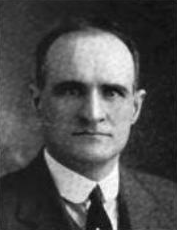Charles Howard McIlwain facts for kids
Quick facts for kids
Charles Howard McIlwain
|
|
|---|---|
 |
|
| Born | March 15, 1871 Saltsburg, Pennsylvania, United States
|
| Died | June 1, 1968 (aged 97) |
| Alma mater | |
| Awards | Pulitzer Prize for History (1924) |
| Scientific career | |
| Institutions |
|
Charles Howard McIlwain (born March 15, 1871 – died June 1, 1968) was an American historian and political scientist. This means he studied history and how governments work. He won a very important award, the Pulitzer Prize for History, in 1924.
He went to Princeton University and Harvard University. Later, he taught at these schools and others, like the University of Oxford. Even though he first trained to be a lawyer, he spent most of his life teaching. He focused on the history of how governments are set up, which is called constitutional history. He was also part of many important groups and was even the president of the American Historical Association.
Early Life and Learning
Charles Howard McIlwain was born on March 15, 1871, in Saltsburg, Pennsylvania. In 1894, he earned his first degree from Princeton University. After that, he moved to Pittsburgh, Pennsylvania. There, he worked as a clerk in a law firm and studied law. By 1897, he was allowed to practice law in Allegheny County, Pennsylvania.
Even though he liked law, McIlwain soon decided to teach instead. In 1898, he got another degree from Princeton University. He then started teaching Latin and history at The Kiski School in Saltsburg. He also coached the track and field team there. In 1901, he left to study more at Harvard University. After getting his master's degree in 1903, he began teaching history at Miami University.
Teaching and Writing Career
In 1905, Woodrow Wilson was the president of Princeton University. He started a new teaching method called the "preceptorial system." This was like a special tutoring system. Wilson met McIlwain and chose him to be one of the first 45 teachers in this new system.
McIlwain taught at Princeton until 1910. Then, he moved to Bowdoin College to become a professor of history and political science. While there, he wrote his first book. It was called The High Court of Parliament and Its Supremacy. Other historians noticed his work. Because of this, he was asked to teach at Harvard in 1911. He became a full professor there in 1916.
McIlwain spent the rest of his teaching career at Harvard. He taught classes about the history of England's government and how political ideas developed. In 1918, he put together a collection of writings and speeches by James VI and I, who was the king of England, Scotland, and Ireland.
In 1923, he published The American Revolution: A Constitutional Interpretation. In this book, he explained that the American Revolution happened because people disagreed. They had different ideas about how the constitution of the United Kingdom should be understood. The next year, he won the Pulitzer Prize for History for this important book.
In 1926, he became the Eaton Professor of the Sciences of Government at Harvard. He wrote another book in 1932, called The Growth of Political Thought in the West. In 1934, he became a special member of the Medieval Academy of America. He was also the President of the American Historical Association from 1935 to 1936. He was a member of other important groups too, like the American Philosophical Society.
In 1940, McIlwain published Constitutionalism: Ancient and Modern. In this book, he talked about how government power and independent judges work together. He also showed how the ideas for the United States' government came from ancient Roman and English history. He updated this book in 1947.
In 1944, McIlwain was a visiting professor at Oxford University in England. He was the first person to hold this special teaching role since World War II began. At Oxford, he was part of Balliol College. He retired from Harvard in 1946.
Later Life and Impact
McIlwain received special honorary degrees from the University of Chicago in 1941 and Yale University in 1951. He passed away on June 1, 1968. In 1986, a special teaching position at Princeton was named after him. Eric Santner was the first person to hold this "Charles H. McIlwain Preceptorship."
Main Books
- 1910 - The High Court of Parliament and Its Supremacy
- 1918 - The Political Works of James I (as editor)
- 1924 - The American Revolution: A Constitutional Interpretation
- 1932 - The Growth of Political Thought in the West: From the Greeks to the End of the Middle Ages
- 1936 - The Historian's Part in a Changing World (a speech he gave)
- 1940 - Constitutionalism Ancient and Modern
- 1947 - The Historian
 | James B. Knighten |
 | Azellia White |
 | Willa Brown |

